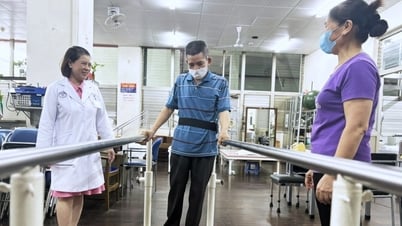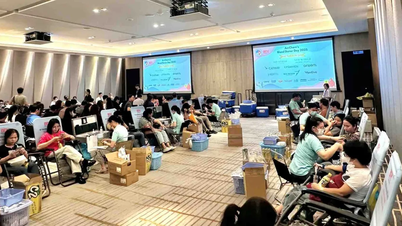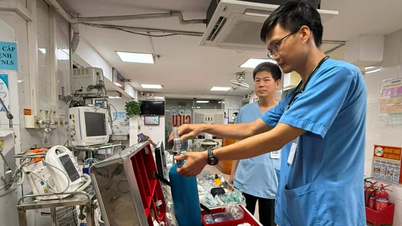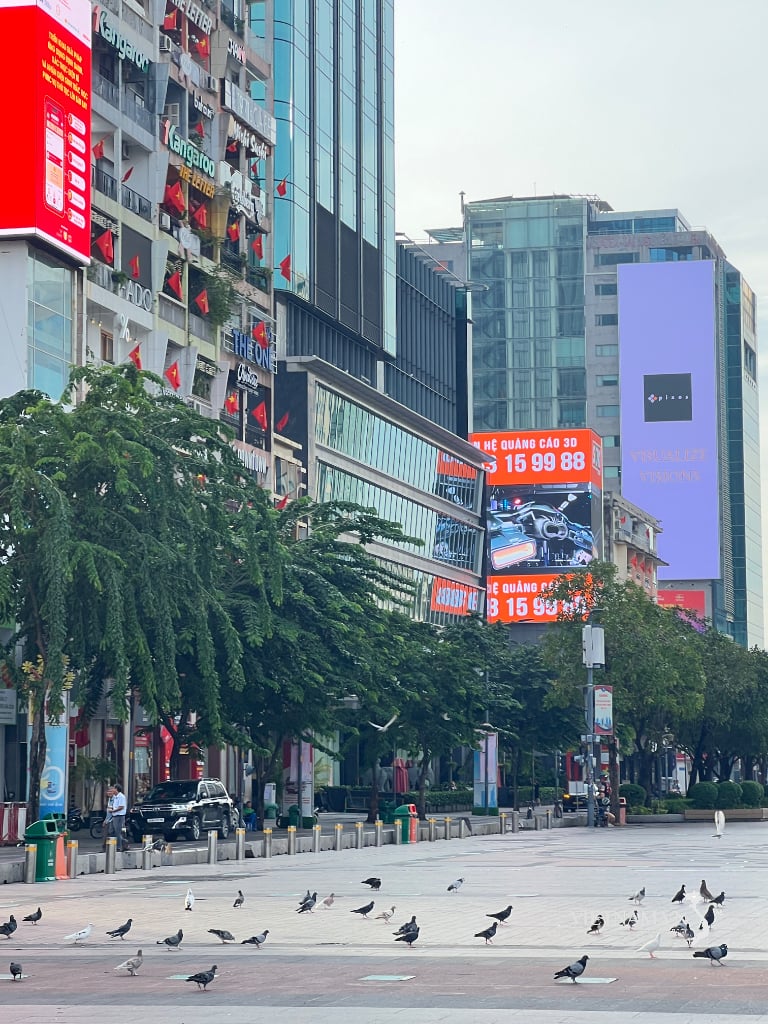The main sources of vitamin B12 are fish, meat, eggs, and milk products - Photo: TTD
Is vitamin B12 related to cancer? Does vitamin B12 deficiency cause high blood pressure, stroke...?
Exhausted by fear of carcinogens
Ms. NTT, 67 years old ( Hanoi ) had breast cancer surgery more than 10 years ago, but she is always afraid of the disease recurring and metastasizing, so she eats very carefully. Whenever she hears that a substance or food has a risk of cancer, she does not use it immediately.
In particular, she avoided all medicines, foods, and even milk containing vitamin B12. She fasted and ate vegetarian food, which caused her body to become exhausted and severely anemic. Doctors warned that they should be careful as many patients died of exhaustion before dying of cancer.
Dr. Nguyen Xuan Tuan, Hung Viet Oncology Hospital, said that many people see that vitamin B12 helps cells divide and grow faster, so they worry that supplementing vitamin B12 can "help" cancer develop, but they do not know that vitamin B12 is also essential for healthy cells to grow and plays an important role in the body.
In recent years, some studies have suggested a link between blood B12 levels and cancer risk, causing many people to suddenly worry about supplementing this vitamin.
Doctors at the Clinical Nutrition Center of K Hospital said that in clinical practice, vitamin B12 is still prescribed by doctors for people with deficiencies based on tests. Some lung cancer treatment regimens also supplement vitamin B12 with acid to minimize toxicity to blood cells (such as leukopenia, thrombocytopenia) during treatment.
Thus, vitamin B12 is essential for the body and should be provided in appropriate doses, preferably from food. Large doses should not be supplemented for a long time...
Don't let vitamin B12 deficiency cause high blood pressure, stroke...
According to Dr. Le Thi Thanh Vui - Center for Hematology and Blood Transfusion, Bach Mai Hospital, vitamin B12 plays an essential role in DNA synthesis, necessary for the division and maturation of red blood cells in the bone marrow. It is very important for maintaining normal function of the nervous system, including the formation of myelin sheaths that protect nerve fibers.
Vitamin B12 deficiency can cause red blood cell anemia with similar symptoms to iron deficiency anemia but is often accompanied by neurological problems such as numbness in the limbs, loss of balance, memory loss and even irreversible nerve damage if not treated promptly.
Dr. Nguyen Van Tuan analyzed that vitamin B12 is a water-soluble vitamin that the body needs in small amounts to maintain its activities. In the human body, vitamin B12 is necessary for the formation of red blood cells, cell metabolism, nerve function and DNA production. Every day, the body of an adult needs 2-2.4 µg of vitamin B12. Vitamin B12 is readily available in foods of animal origin such as meat, fish, eggs, milk...
Vitamin B12 deficiency is common in vegetarians, people with reduced gastric acid secretion, immune atrophic gastritis, gastric resection or gastrojejunostomy, enteritis, biliary-pancreatic disorders...
The consequences of vitamin B12 deficiency, in addition to anemia, can be very serious. Nerve damage due to vitamin B12 deficiency develops relatively slowly. If treated early, recovery is possible. In cases of late treatment, long-term sequelae may result.
The disease manifests itself as loss of sensation in a localized area of the body controlled by the damaged nerve. Sometimes
There are severe pains spreading throughout the body. In addition, the patient also feels weakness or paralysis of the limbs.
In particular, a study on vitamin B12 deficiency in the elderly showed that elderly people with vitamin B12 deficiency had a higher frequency of stroke and high blood pressure than the group without vitamin B12 deficiency.
Take only when in need and as directed by a physician.
Vitamin B12 is essential and should only be supplemented when there is a deficiency or as prescribed by a doctor. Do not arbitrarily use high doses for a long time, especially through injections or large doses of pills. Prioritize supplementation from diverse, balanced foods. If your diet is deficient or your body needs higher nutrition (elderly, chronically ill, undergoing chemotherapy), you can choose a reputable and quality supplement product.
Multivitamins with low B12 levels within acceptable limits do not generally increase cancer risk.
"It's best to eat a variety of foods every day and if you need to supplement, choose a reliable product that meets your body's needs," Dr. Tuan advises.
Who is often deficient in vitamin B12?
People with an inappropriate diet, found in long-term vegetarians. People with total gastrectomy. People with congenital deficiency of essential elements for vitamin B12 absorption. People with intestinal diseases such as malabsorption. In the elderly, about 10-30% have spontaneous reduction in vitamin B12 absorption.
What foods provide vitamin B12?
The elderly have a high rate of vitamin B12 deficiency, 10-30%. The disease develops silently and latently because vitamin B12 stored in the liver is enough for two years, so the elderly need to pay attention to detect the disease early.
But prevention is better than cure, so after the age of 50, you should pay attention to supplementing vitamin B12 by eating foods rich in vitamin B12 or taking medication as directed by your doctor.
There is no need to use too much because the body's need for vitamin B12 is low, only about 6 micrograms per day. There is also no need to use it continuously because vitamin B12 is stored in the liver. We can use it for a while, then stop and use it again.
The main sources of vitamin B12 are animal products such as meat (especially liver and kidney); fish and seafood (salmon, tuna, sardines, clams, oysters); eggs (especially yolks); milk and dairy products (cheese, yogurt).
Back to topic
HA TUONG
Source: https://tuoitre.vn/hieu-sai-vitamin-b12-co-the-gay-ung-thu-nen-tron-tranh-mac-ke-suy-kiet-20250819232803901.htm












































































































Comment (0)